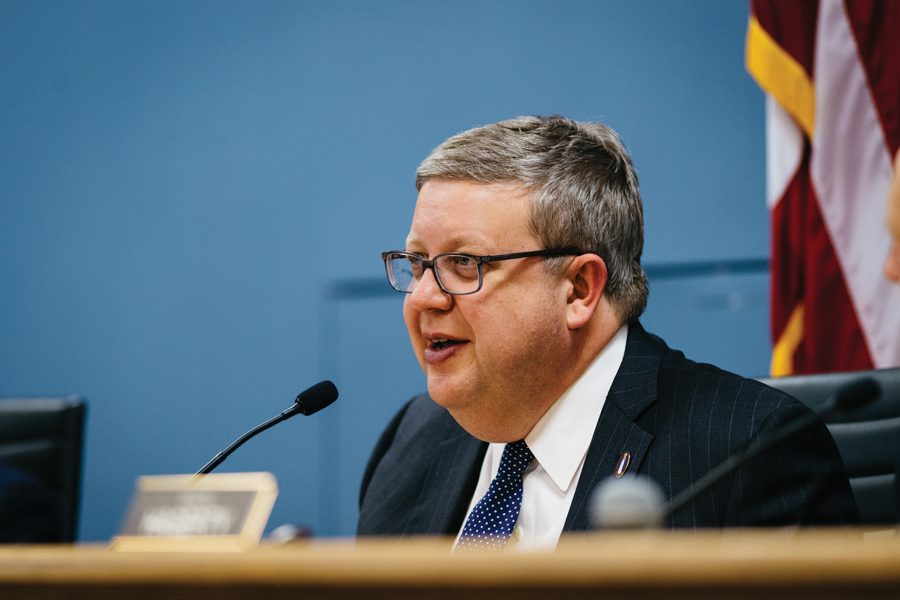City conducting ‘base-level’ research on municipal ID program
Noah Frick-Alofs/Daily Senior Staffer
City manager Wally Bobkiewicz speaks at a city meeting. Bobkiewicz said Evanston is conducting “base-level” research into a municipal ID program.
April 27, 2018
Evanston is in early stages of researching the possibility of implementing a municipal identification card program, city manager Wally Bobkiewicz said.
Cities around the country — including New York, Detroit and San Francisco — have already implemented municipal identification programs, used to facilitate access to public services. Chicago Mayor Rahm Emanuel’s municipal ID plan for the city cleared the city council last week, but not before several aldermen expressed concerns about the program.
The topic has not yet been brought before the Evanston City Council and has just been discussed at the staff level, Bobkiewicz said.
Assistant city manager Erika Storlie said early cost estimates for a municipal ID program in Evanston could be more than $20,000, and the program would need to be approved by City Council. Bobkiewicz said the estimate considers the cost of the ID cards themselves but does not necessarily consider the cost of maintaining systems to “string” together all of the information collected.
Bobkiewicz said the city has been researching a potential ID program for about two years, but it remains a “medium-burner project at best” because there has been no pressure from the Evanston community to pursue a plan like this. He said he does not expect an ID program to be presented to council in 2018.
Emanuel’s Chicago plan comes as a response to President Donald Trump’s promise to crack down on people living in the U.S. illegally. He sees the IDs as a way to give Chicagoans without driver’s licenses or Social Security numbers the means to pay bills, make police reports or gain access to public buildings and services.
Chicago’s plan has drawn concerns from both sides of the immigration debate — some immigrant allies worry that the IDs could help federal agents deport undocumented immigrants, while critics say the plan could pose a risk to national security.
However, Bobkiewicz said any Evanston program even slightly resembling Chicago’s municipal ID plan would not intend to serve as proof of residency or citizenship, but rather aim to provide “ease of access” to city services. He said the idea for the program started from a desire of multiple city departments to improve access to services, particularly with the Evanston Public Library.
“We’ve taken the approach from a different perspective,” he said. “It’s been, ‘How can we best allow residents to access our programs in a way where you could just swipe a card versus having to register and sign in for something?’”
He also said concerns around data collection and privacy are at the forefront of the research on this topic. Data collected from the cards could also be used to tailor city services to best serve the community, Bobkiewicz said.
“Communities all over America are grappling with how to collect data, what’s too much data, where do privacy considerations fit in,” he said.
Bobkiewicz added that concerns about collecting data have slowed down the research process because there “are no easy answers to the big data questions.” He said a “progressive” community like Evanston is likely to be very concerned about the collection of data, so city staff want to be sure that an ID plan is fully researched before it is introduced to the public.
City staff will keep a careful watch on Chicago’s plan to get inspiration and learn from its mistakes. As staff continues to do “base-level” research for a potential plan, Bobkiewicz does not expect to formally discuss an ID program with the council until at least 2019.
“We’ve made no conclusions,” he said. “We’ve just been gathering data and trying to get our head around the issues themselves and how they might apply here. At some point I’m sure it’ll be ripe for more of a public dialogue.”
Email: [email protected]
Twitter: @sydstone16


